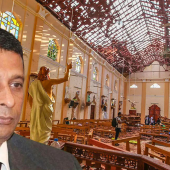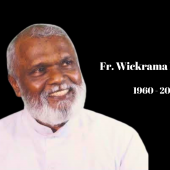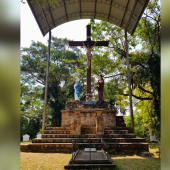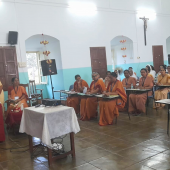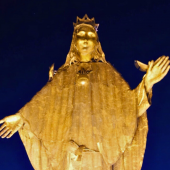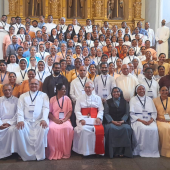Sri Lankan Bishop Maxwell Silva: Leaders need more sense of nationalism
The church in Sri Lanka, the South Asian country, is doing its share of human development and progress in society, said Colombo Auxiliary Bishop Sampathawaduge Maxwell Greenville Silva.
Fr. Kasmir Nema, a journalist for Radio Veritas Asia, conducted a recent interview with him.
“The Church [in Sri Lanka] plays a significant role in all areas—economy, education, and society,” he said, noting that many of the local Catholics are engaged in agriculture, especially fishery and farming.
Silva pointed out that the production of tea and coconuts is a primary source of livelihood for the people in the country.
He revealed that the leaders of the island nation of more than 22 million inhabitants need a strong sense and practice of nationalism to advance the people’s lives and the society as a whole.
“The Church has always tried to support and uplift the [lives] of the people, but unfortunately, we have lacked patriotic leadership at the national level,” he said.
Sri Lanka went through challenges recently, and the people living in the margins of the society were the most vulnerable, Silva noted.
“The past five years have been turbulent,” he said. Like many countries, we have suffered economically, politically, and socially. Unfortunately, many of our politicians have exploited the people.”
This democratic socialist republic has heavily relied on imports and exports, Silva noted. Agriculture was the main source of income among 70% of the population.
The country’s agriculture suffered from a severe crisis, largely prompted by a sudden ban on chemical fertilizers and pesticides in 2021 under the government of former President Gotabaya Rajapaksa.
Silva saw this government policy as a devastating punch to this democratic socialist republic’s agriculture.
In April 2021, the government prohibited the importation and use of synthetic fertilizers and pesticides in a move to transition to organic farming.
Concerns about the impact of synthetic fertilizers on human health and the environment drove the government to impose the ban. It was also prompted to save foreign exchange by cutting down the need for imported fertilizers.
However, the ban on fertilizers led to a sharp decline in crop production and a surge in crop and food prices.
In November 2021, the government partially reversed the ban on fertilizers, allowing the importation of synthetic fertilizers for certain export crops in response to widespread protests by farmers and the growing economic slide. However, this move has not fully addressed the impact on the production of crops.
“A serious mistake was made when the government cut off support for agriculture, including fertilizer,” he said. “This hurt our farmers and the economy deeply.”
Sri Lanka is a small island country, but it is rich in diversity and natural beauty, Silva noted.
About 1.5 million of the population are Catholics, he said. More than half of the country’s Catholics live in the Archdiocese of Colombo.
Radio Veritas Asia (RVA), a media platform of the Catholic Church, aims to share Christ. RVA started in 1969 as a continental Catholic radio station to serve Asian countries in their respective local language, thus earning the tag “the Voice of Asian Christianity.” Responding to the emerging context, RVA embraced media platforms to connect with the global Asian audience via its 21 language websites and various social media platforms.









